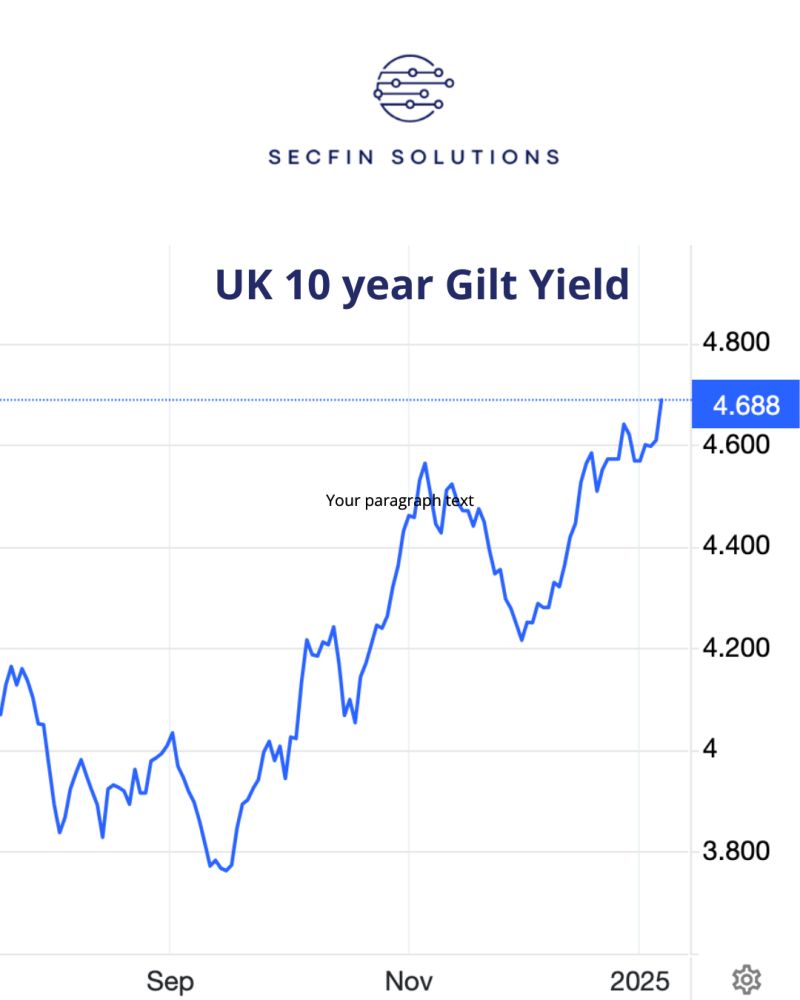

The Financial Times has reported that the yield on 30-year gilts has reached 5.25%—a level unseen since 1998. This spike in borrowing costs poses a significant challenge for Chancellor Rachel Reeves, whose fiscal rules have already left limited room for manoeuvre.
I just heard this reported on the mainstream Times Radio so this bond sell-off is now in the main news and I fear for the bond market in the UK (and globally).
💷 What’s Driving This?
The increase comes amidst a global bond sell-off and investor concerns over the UK’s economic outlook, including:
Stagflation Risks: Persistent inflation combined with slow growth is deterring investment.
Economic Weakness: The UK economy contracted for the second straight month in October and flatlined in Q3.
Policy Impact: Tax hikes and rising labour costs, such as higher National Insurance and the National Living Wage, are weighing on business confidence.
🔍 Why It Matters
Higher borrowing costs amplify the strain on public finances. Reeves’ fiscal rules, designed to limit borrowing for current spending, already leave just £9.9bn of headroom. With sustained yields, economists suggest this could shrink to as little as £1.1bn—forcing difficult choices.
📊 What’s Next?
The Treasury awaits updated forecasts from the Office for Budget Responsibility (OBR) in March. If projections show a breach of fiscal rules, the government may face pressure to tighten spending or introduce new tax measures.
⏳ The Broader Context
These developments come amid global financial uncertainty. The UK is uniquely vulnerable due to its mix of sluggish growth, sticky inflation, and high-volume gilt sales. A “buyer’s strike” on ultra-long-term debt reflects waning investor confidence in the UK market.
🎯 The Takeaway
For businesses and investors, this is a stark reminder of the challenges ahead. Fiscal credibility remains critical, but the margin for error is razor-thin. Reeves’ focus on rooting out waste and growing the economy will need to deliver tangible results to avoid a fiscal credibility crisis.
🌍 Your Perspective?
How do you think the UK should navigate this complex economic environment? Will we see a shift in fiscal policy or a broader market adjustment? Let’s discuss in the comments below. 👇
FT article by Ian Smith and Sam Fleming . Chart from TradingEconomics
Want to be notified about all my posts? Ring my bell 🔔
SecFin Solutions Education and Consulting Services
https://lnkd.in/dfQyAQpZ
Understanding the New Era of Mandatory Clearing in U.S. Treasuries
https://lnkd.in/eBtdzizD
A Guide to the Bank of England’s New NBFI Repo Facility
https://lnkd.in/ekYzFb6g
Navigating UK Money Market Fund Reforms
https://lnkd.in/eHr3HyQa
AI and the Future of Securities Finance
https://lnkd.in/e5faRPtN

At SecFin Solutions, Glenn Handley epitomises expertise and innovation in global finance and management consulting.
Sign up to hear about our services and stay updated with the latest insights. Please enter your email address.
Access Specialised Training and Consulting Services Designed to Boost Your Financial Acumen and Success
